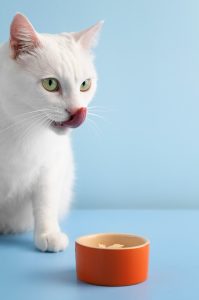
It is very important that we maintain our beloved cats at a healthy body weight. Of course, they are beautiful at any size! However we do find that overweight cats are very high risk for several health issues including:
– Joint and back pain
– Diabetes
– Urinary problems or life-threatening bladder blockage
– Heart problems
Research suggests that pets that are a healthy body weight tend to live an average of two years longer than pets that are obese!
Fortunately, there are many effective options for weight management in cats. We are in full control of their diet after all, and so if the family is motivated we can have great success at achieving and maintaining a healthy body weight.
1. Free access to food
While some cats will ‘self regulate’ and eat only what their body needs, others will ‘eat from the heart’ and eat more than they need to if the food is available.
2. Individual metabolism
While some cats can eat a large amount and stay lean, other cats may have a slower metabolism and their body may only need a small amount of food. This doesn’t mean that the diet is not a problem – it means we need to consciously feed some cats less food compared to other cats. Each cat has their individual needs, and there is no point in saying “but I don’t feed them very much!” If your cat is overweight, then they are eating more than their body needs.
3. Type of food
In general, dry food (also known as biscuits or kibble) is very calorie dense. Most cases of obesity in cats are due to consuming excessive amounts of dry food. In comparison, wet food (e.g. tinned food or meat) is much lower in calories when compared by volume, as it contains approximately 50% water. This means a cat that fills its stomach on dry food rather than wet food will be consuming a largr amount of calories.
4. Exercise
Increasing exercise might help a little bit on your cat’s weight loss journey, but the most significant factor is going to be their diet.
These ideas should be adjusted to suit the individual cat and the household dynamics to ensure the plan works for everyone. A discussion with one of our vets and nurses may help you to find the best strategies for your situation. However, in general, what we advise is:
– Focus on feeding mostly wet food where possible. This can be small frequent meals if needed to keep your cat happy (and to stop them from nagging you!).
– Consider cutting back on dry food, or eliminate it entirely if possible. If you must feed dry food, ensure it is always a measured and limited amount, not free access to a never-empty bowl.
– Consider providing the dry food only in food puzzles, toys or treasure hunts so the cats must work and play to gain the food. This is also great for fun, exercise and mental stimulation.
– We find many cats do well adding small amounts of cooked zucchini or pumpkin into their wet food, so that they feel full more easily without extra calories.
– In some cases, using a specially designed commercial diet such as Hills Metabolic or Royal Canin Satiety can be helpful.
– In a multi-cat household, try to find strategies to avoid your overweight cat from eating the other cat’s food. This might include feeding them in separate rooms (with doors closed until the meal is over) or using microchip-reading feeders so they can only access the food designated for them.
– Encourage play and exercise where possible
We suggest weighing your cat about once per month (at home or at the clinic) to ensure the food plan is working well. We aim for slow, steady weight loss of around 100g per month. If weight loss is too drastic, increase the food plan slightly as we don’t want to make them unwell with rapid weight loss. On the other hand, if the scales are not trending downwards, we will need to readjust the diet and come up with a more effective food plan.
https://icatcare.org/advice/obesity-in-cats/
Best of luck with your cat’s weight loss journey! We have seen many success stories and happier, healthier, more comfortable cats using the strategies above. Please keep in touch and let us know if you need any further guidance.
This post was written by our clinic’s Dr Grace Woodward.
A clinic designed exclusively for cats
Monday – Friday 8.30am – 5.30pm
Saturday 8.30am – 12.00pm
(Closed every second Saturday)
Sunday & Public Holidays closed.